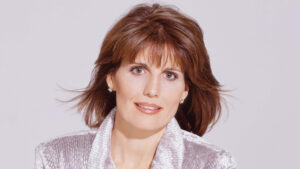
Since 1973, Lucie Arnaz has been, as they say, treading the boards. In those early days it was in Summer Stock (you kids can look that one up). But it wasn’t too long before she originated her first role in the musical They’re Playing Our Song. The 1979 Broadway hit had songs by Marvin Hamlisch and Carole Bayer Sager and a book by Neil Simon.
Later in her career she originated the part of Alexandra Spofford in the musical adaptation of The Witches of Eastwick.
Throughout her career Arnaz has performed such roles as Sally Bowles in Cabaret, Princess Winnifred in Once Upon a Mattress, Mabel Normand in Mack and Mabel and Berthe in Pippin. She’s had a vast career and it is precisely that career she is celebrating in her show I Got the Job! – Songs From My Musical Past which she will perform on October 22nd and 23rd at Catalina Jazz Club in Los Angeles and October 30th and November 1st at Feinstein’s at the Hotel Nikko in San Francisco. Between those dates she’s performing An Intimate Evening with Lucie Arnaz at the Purple Room in Palm Springs October 25th – 27th.
For those who don’t already know, Arnaz is the daughter of Lucille Ball and Desi Arnaz. She grew up in and around showbiz royalty.
Recently I spoke with Arnaz about her stage career, the shows she’s doing and what the future might have in store for her – whether on a Broadway stage or elsewhere. What follows are excerpts from our conversation that have been edited for length and clarity. To see the full interview, please go to our YouTube channel.
Q: I want to ask you about something your mother is quoted as having said she said, “I’d rather regret the things I’ve done than regret the things I haven’t done.” As you as you were putting this show together, what role did time and perspective give you in reviewing the jobs you got and the jobs you didn’t?
It’s a good question, actually. You look back on it now – several decades after you’ve done some of these shows – and the choices I make, even to pick the material from the show, sometimes I picked songs that my character didn’t even sing because another song means more to me now. Or there’s a better story that goes along with it or something. In this particular show, I’m not 100% sure that it affected what I choose to sing.
It’s my most authentic show to me because it really is how I started and how I got from point A to point B by playing all these different characters. So each and every song is a little scene. It’s a playlist from that show, even if I do it in a little bit different way.
I want to take you back to when you were 22 because you appeared in two productions of musicals that are actually on Broadway now. You were Princess Winifred in Once Upon a Mattress, which was in Dayton, Ohio, and you were Sally Bowles in Cabaret in Flint, Michigan. What resonates with you most about that time of your life being in those two shows?
Just the most amazing opportunity to really learn your craft here in regional theaters or what they used to call summer stock in those days. And you had to put a show together with a week of rehearsal. So you better come knowing your stuff. And I had been trained, you know, on live three-camera, live audience television, which we did sort of the same way. We had a week to put a show together and know everything you’re going to do and then perform it in less than a week – four days.
I guess Mattress was my first, and I just loved it. I loved that you had to work as a team and get that show on in such a short period of time. It was just fantastic training, really. I love it. I made a family of friends that I still have to this day because you’re all in the trenches together to get that to happen.
What is easier to put together that quickly: the comedic role of Princess Winifred, in the course of a week or to put together a Sally Bowles in a week?
I think it’s equally challenging because, for example, using Once Upon a Mattress. There’s so much physical stuff to do in that show: the climbing and all of the pratfall. She was a real interesting character to play and you had to be really good at it to make it look really bad. To make it look foolish. And so they don’t have a lot of time to do that. I worked really hard to make her believable. That’s all I ever really want to do is make these people believable. It could be a comedy. It could be a drama. To me, it’s kind of the same.
My mother, you mentioned her in the beginning, she always was believable. Their writers were so good that they wrote situations that were crazy predicaments. You would think, how on earth? But they were so brilliantly constructed that you believed what they were going to go do. And as long as that’s written that way, then you can just fly with it and think this actually could happen.
Last year I spoke to Gavin Creel, who was doing Into the Woods. He talked to me about his time in Chicago working on Bounce with Stephen Sondheim. Hal Prince was director. He talked about what the experience was like to be in the room and watching people struggle to do the best work that they could for a given show. You’ve been in that situation several times. They’re Playing Our Song was one of them, where you got to be in the room with Marvin Hamlisch, Carole Bayer Sager and Neil Simon. What was that experience for you?
That is such a gift. I can’t tell you. It’s only happened to me twice in my life where I could be in the middle of the making of a brand new musical. And it’s always a little different. When I did Witches of Eastwick in London with Cameron Mackintosh and all those gals and stuff. It was a slightly different experience, much bigger deal, all the flying. It was Cameron Mackintosh and bazillions of dollars and whatnot. [With They’re Playing Our Song] we were doing a two character musical in Los Angeles. We had three weeks of rehearsal, Witches had four months. To watch these geniuses, people like Marvin and Neil, figure out what works, what doesn’t, and why.
One of the things I learned from [Marvin], which just changed the way I look at myself forever because we were rehearsing a number – one of the ballads – and I’m trying to find my way around the song. How am I going to sing it? Where am I going to breathe? And he stopped and he said, okay, okay, wait, stop. I think I want to lower the key here for you in this song. I was so devastated. I was so embarrassed. Many people heard him say that. I went, Marvin, I’m so sorry. I know I can hit these notes. I kind of go at it easy in the beginning. And then he goes, “Stop. Would you stop already? You think I’m married to these notes?” And I looked at him like, What are you talking about? He said, “Lu, I hired you for the sound, the quality of your voice. Every instrument is different.” I was a singer. A composer like Marvin Hamlisch wanted to write a song for me. It changed my life.
Then to watch Neil watch us try to stage a scene. He’s Neil Simon. He’s the most prolific comedy writer. He’s chewing on his glasses and he doesn’t look happy. I got really nervous as I thought, what if I get fired? What if he decides these kids are not the right kids for this? He got up and he left. I panicked and we finished the day. We still didn’t stage the thing properly. The next day he came in and handed us all new pages and said, “When anything is that hard to stage, it’s always the writing.” He just went home and rewrote it and he didn’t even rewrite it that much. Boom, it staged itself. I just loved that that he didn’t sit there and blame somebody else.
Let me ask you about something you posted on Facebook on October 9th. You said “It’s stressful times. Let Ron Abel [her music director] and I take your pain away for 85 minutes.” How does doing this show take away your pain and does that relief last longer than 85 minutes for you?
This show is a feel good explosion of emotions all over the board. I focus a lot to do it. And I go into this other wonderful world, this memory world, and play a whole slew of characters that I have had the opportunity to do. I think for people who are, let’s just say a little anxious right now, it’s healthy because I truly believe in sort of a woo woo metaphysical way of looking at life. That we need to visualize what we want the new Earth to be like, the new planet to be like, the new politics, if you will. How are we going to care for one another? How are we going to learn to be kind again? When I watch too much of my favorite shows like MSNBC or CNN or whatever, or read too much of the New York Times, it can be very stressful and it’s not helping me visualize the alternatives. So these days I’m looking for Lucie Arnaz shows. I’m looking for places to go where people are going to take me out of this week.
I think people have to work hard right now to keep their batteries charged and don’t give up. Don’t lose hope. We’ll get through this together. There may be some turbulence along the way. It could be severe turbulence. Buckle up. But when we get to the other side, the dust is going to settle and it’s going to be a different, better scenario for everybody. That’s my feeling.
I’m going to ask you to go back in the time machine one more time, and that’s to September 17th, 1967. You appeared, uncredited, as the girl in the golf cart on the second episode of The Mothers in Law. What would you tell that teenage girl about what her life and her career would be?
That’s a good question. Really? If I could go back to me at that age, I would just tell her to just settle the hell down. I look back and I go, honey, I didn’t know who I was. I had this way of talking. It was just bizarre. I just had no idea what I was good at. I had no idea where I was going. My brother was already in a rock group and was a rock and roll star at 11. My mother had this great television series. My father was a producer, ran a studio. [He] had this band, he made all this gorgeous music. What is it that I do? I hadn’t found the theater yet. I would just say, Honey, know that you are enough. You will find your bliss. Find the thing that belongs to you and stick with it. That’s what I eventually did. But if I could get to her just a tiny bit sooner, I think I would have been a lot happier.
You do realize you’re describing what most teenagers go through which is not knowing what they want to do when they’re teenagers. Plus you were surrounded by a very different family dynamic.
I kind of knew I would be in the business. I just wasn’t sure how to do it. I always loved performing: a little theater, my backyard. I picked my high school because it had a theater arts department that was great. I kind of knew I was going to get there somehow. I guess if we could go to our teenage self, we’d say, settle down, you’re going to be fine. You’re good, just as you are, honey. Don’t try to be everybody else. You have to find your own voice, your own way of performing a song.
And indeed you have. That’s what you’ll be celebrating in these shows.
Indeed I will.
To watch the full interview with Lucie Arnaz, please go here.
All photos of Lucie Arnaz courtesy Catalina Jazz Club.


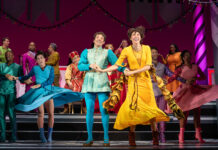
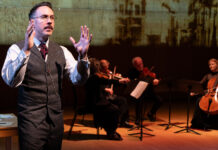
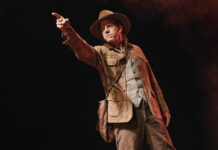
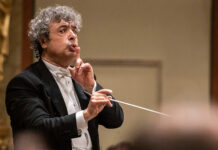




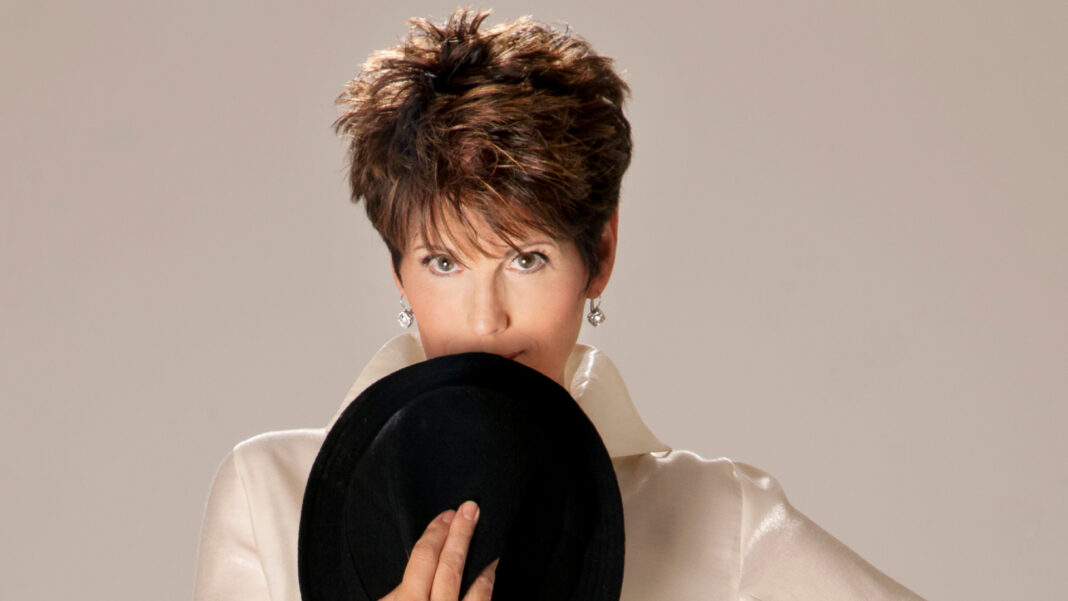
This brightened my day! Great questions and thoughtful, sage responses.
Thank you for your kind words and for reading this story. Be sure to check out our YouTube channel to see the full interview!